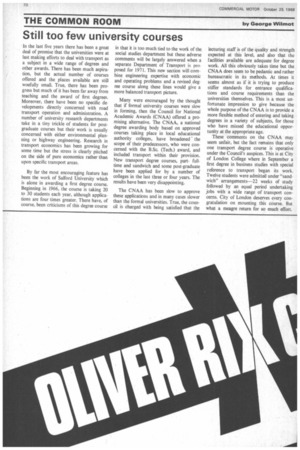Still too few university courses
Page 72

If you've noticed an error in this article please click here to report it so we can fix it.
In the last five years there has been a great deal of promise that the universities were at last making efforts to deal with transport as a subject in a wide range of degrees and other awards. There has been much aspiration, but the actual number of courses offered and the places available are still woefully small. True, there has been progress but much of it has been far away from teaching and the award of first degrees. Moreover, there have been no specific developments directly concerned with road transport operation and administration. A number of university research departments take in a tiny trickle of students for postgraduate courses but their work is usually concerned with either environmental planning or highway engineering. Research in transport economics has been growing for some time but the stress is clearly pitched on the side of pure economics rather than upon specific transport areas.
By far the most encouraging feature has been the work of Salford University which is alone in awarding a first degree course. Beginning in 1966, the course is taking 20 to 30 students each year, although applications are four times greater. There have, of course, been criticisms of this degree course
in that it is too much tied to the work of the social studies department but these adverse comments will be largely answered when a separate Department of Transport is proposed for 1971. This new section will combine engineering expertise with economic and operating problems and a revised.degree course along these lines would give a more balanced transport picture.
Many were encouraged by the thought that if formal university courses were slow in forming, then the Council for National Academic Awards (CNAA) offered a promising alternative. The CNAA, a national degree awarding body based on approved courses taking place in local educational authority colleges, have broadened the scope of their predecessors, who were concerned with the B.Sc. (Tech.) award, and included transport within their provision. New transport degree courses, partfulltime and sandwich and some post-graduate have been applied for by a number of colleges in the last three or four years. The results have been very disappointing.
The CNAA has been slow to approve these applications and in many cases slower than the formal universities. True, the council is charged with being satisfied that the lecturing staff is of the quality and strength expected at this level, and also that the facilities available are adequate for degree work. All this obviously takes time but the CNAA does seem to be pedantic and rather bureaucratic in its methods. At times it seems almost as if it is trying to produce stiffer standards for entrance qualifications and course requirements than the universities themselves. This is a most unfortunate impression to give because the whole purpose of the CNAA is to provide a more flexible method of entering and taking degrees in a variety of subjects, for those who have missed the educational opportunity at the appropriate age.
These comments on the CNAA may seem unfair, but the fact remains that only one transport degree course is operative under the Council's auspices. This is at City of London College where in September a first degree in business studies with special reference to transport began its work. Twelve students were admitted under "sandwich" arrangements-22 weeks of study followed by an equal period undertaking jobs with a wide range of transport concerns. City of London deserves every congratulation on mounting this course. But what a meagre return for so much effort.
















































































































